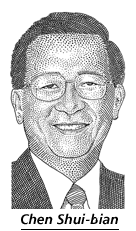|
|
|
|---|---|
Committed to Taiwan |
|
|
Review & Outlook Thursday, April 26, 2001 In a live interview with CNN this week, President Bush gave the strongest indication yet that the U.S. would go to Taiwan's aid if it were attacked by mainland China. Asked whether American forces would get involved if Taiwan came under attack, Mr. Bush affirmed the U.S. had an obligation to step in, and would do "whatever it took" to help the island defend itself. 
This came a day after the announcement of a substantial list of weapons which the U.S. will sell to the young democracy; the President also told reporters this week that future arms sales will no longer have to wait for a yearly review, but will be approved on an ad hoc basis. It's clear Mr. Bush and his advisers are trying to send a message to the People's Republic. The message is that the U.S. sees a strong national interest in preserving Taiwan's democracy, and China's attempts to undermine support for the island through bluster and threats will have the opposite effect. Beijing's refusal to renounce the use of military force to retake what it considers Chinese territory and the buildup of missiles and other forces along the coast opposite Taiwan require that the Republic of China's military be reinforced. The level of reinforcement will depend largely on China's future cross-Strait posture. The arms sales struck a good balance for the first year of Mr. Bush's Administration. Taiwan's National Revolutionary Army will get a quick infusion of weapons it can use, particularly for a navy whose capabilities have been lagging behind. But the most advanced weapons Taipei asked for, the Aegis system and the latest generation of Patriot missiles, are being held in reserve. This is probably wise, since the NRA will need some beefing up before it can use these effectively anyway, and it gives Beijing concrete evidence that the U.S. is taking a wait-and-see attitude toward Taiwan's security requirements. The island is now better equipped to meet the threat of a naval blockade posed by China's Russian-built submarines and destroyers; if China places more ballistic missiles in Fujian, sophisticated anti-missile defenses will soon be on their way. The U.S. should now begin a crash program to integrate Aegis into a theater missile defense system both for itself and possibly for Taiwan. Moreover, thanks to Mr. Bush's statements repudiating the policy of "strategic ambiguity," there is now less chance of a miscalculation by China's leaders that they could attack an isolated Taiwan and then tough out the resulting international opprobrium. U.S. prestige is irretrievably on the line in Taiwan -- even though there is no formal alliance between the two, a defeat for the island would also finish off America's reputation as a reliable security partner. The most telling aspect of the Bush Administration's Taiwan policy is the stepping up of military-to-military contacts. This will help the NRA improve its training and coordination between the branches, as well as boost morale. Taiwan faces the challenge of shifting from a large conscript army to a leaner, more lethal professional force. It needs a well-trained officer corps if it is to use advanced weapons effectively. President Chen Shui-bian seems to understand the need to reduce the dominance of mainlanders in the leadership and shift the emphasis from the army onto the navy and air force. U.S. involvement will help him to make the many necessary reforms. China may not like these new policies, and is already beginning to rail against them as interfering in Chinese affairs and a violation of past commitments. But this background noise is unimportant. The key thing to watch is whether China proceeds with talks on direct cross-Strait transportation links. The economic ties between Taiwan and China are growing exponentially stronger, and Beijing has a chance to nurture them and play up the shared cultural heritage. If it chooses to do so instead of issuing threats, it stands a good chance of eventually convincing the majority of the island's population, which currently favors the status quo, that some form of loose confederation is desirable. The Bush Administration is doing its part to promote a peaceful solution of the cross-Strait issue, not by pushing Taiwan into any such accommodation, but by firmly closing off Beijing's military options. |
|
